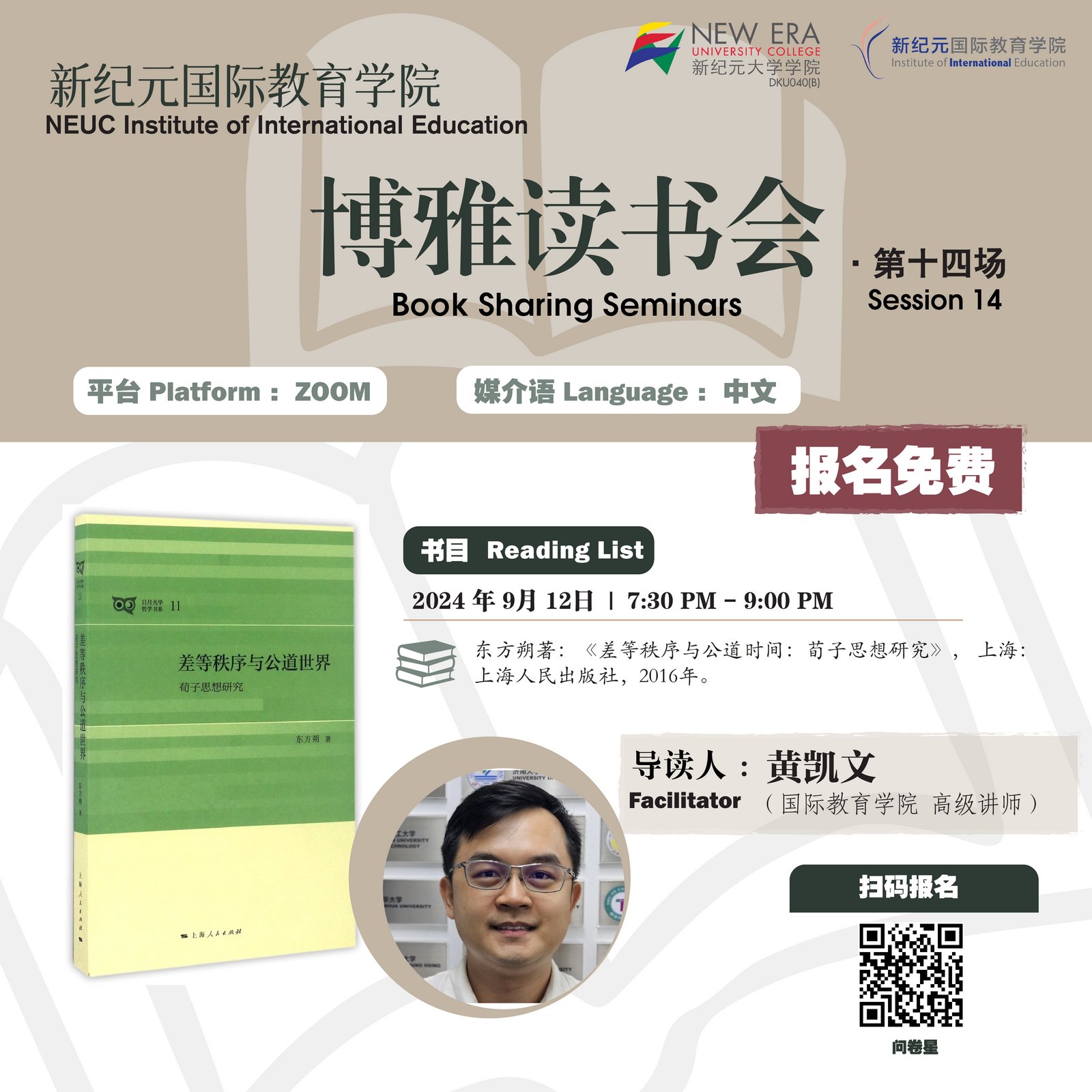14th Book Sharing: Hierarchical Order and a Just World: A Study of Xunzi's Thought
Upcoming Event

| Introduction | To encourage student reading, the Institute of International Education at New Era University College is organizing a book club featuring guided readings and discussions to provide students with a richer platform for academic exchange. This session invites our university's Senior Lecturer, Mr. Ng Khai Boon, to lead a discussion on Professor Lin Hongxing's (pen name Dongfang Shuo) work, Differentiated Order and a Just World: A Study of Xunzi's Thought. |
| Speaker | Ng Khai Boon graduated from the Department of Chinese Studies at the University of Malaya and holds a master's degree in philosophy from Fudan University, China. He is currently a PhD candidate in the Department of Philosophy at Nanyang Technological University, Singapore. He has served as a research assistant at the Institute of China Studies, University of Malaya, and the Centre for Malaysian Chinese Studies; a teaching assistant and lecturer at Nanyang Technological University; and is currently a senior lecturer at the Institute of International Education, New Era University College. |
| Reading Material | Dongfang Shuo, Differentiated Order and a Just World, Shanghai: Shanghai People's Publishing House, 2016. |
| Content Overview | The doctrine of "innate goodness" is considered mainstream in Confucian thought, representing orthodox Confucianism; thus, Xunzi, who advocated "innate evil," has long been viewed as a deviation from the Confucian path. However, in recent years, studies on Xunzi have flourished. Not only have many significant works on Xunzi been published in East Asia, but the English-speaking academic community has also shown considerable interest in Xunzi's thought and philosophy. Why has this phenomenon occurred? Can Xunzi's thought provide alternative intellectual resources to Mencian philosophy, allowing us to understand Confucian philosophy more deeply? Professor Lin Hongxing's 2016 publication, Differentiated Order and a Just World: A Study of Xunzi's Thought, offers answers and new perspectives, promoting the contemporary development of Confucian philosophy. |
| Seminar Information | Date: September 12, 2024 (Thursday) Time:7.30pm - 9.00pm Platform: ZOOM Registration Link: https://tinyurl.com/bp4uyeav *Free registration, due by September 11, 2024. |
Book Sharing Postscript
The Institute of International Education has held a book sharing seminar on the study of Xunzi's thought on 12 September 2024 (Thursday) at 7:30pm. The event featured senior lecturer Ng Khai Boon from the institute, with a presentation based on the book "Hierarchical Order and a Just World: A Study of Xunzi's Thought," written by Lin Hongxing. The presenter focused on the third chapter, "ke yi er bu ke shi (capable but cannot be made to will): An Interpretation Centered on Xunzi's 'xing (human nature) is bad,'" explaining the context in which the author wrote the book. The book sharing seminar has attracted around 30 participants.
How should Xunzi, known for his theory of the "xing is bad," be understood from the mainstream Confucian notion of the "xing is good"? The author points out that while Xunzi criticizes many aspects of Mencius's views, he never denies the existence of moral capacity in the heart/mind. Instead, beyond the moral capacity of heart/mind, Xunzi has a more cautious understanding of human "emotional desires." Based on the concepts of "yu duo wu gua (many desires but few resources)" and the idea that people "ke yi er bu ke shi", Xunzi believes that following the development of "emotional desires" can lead to social chaos and disorder. Thus, he consistently emphasizes that social good is artificially constructed.
Mencius's discussions on social education are insufficient, and Xunzi serves as a supplement in this regard. The pursuit of equal moral requirements for all individuals is theoretically unfeasible, which necessitates relative distinctions of hierarchy and wealth to accommodate different people's emotional desires appropriately. Therefore, the author argues that we can draw on from Xunzi's thought to offer solutions for contemporary issues related to multicultural integration. The construction of a Confucian hierarchical order may also provide a different perspective for today's emphasis on freedom and equality in societal development.



